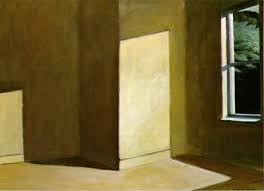‘This was Mr Bleaney’s room. He stayed
The whole time he was at the Bodies, till
They moved him.’ Flowered curtains, thin and frayed,
Fall to within five inches of the sill,
Whose window shows a strip of building land,
Tussocky, littered. ‘Mr Bleaney took
My bit of garden properly in hand.’
Bed, upright chair, sixty-watt bulb, no hook
Behind the door, no room for books or bags –
‘I’ll take it.’ So it happens that I lie
Where Mr Bleaney lay, and stub my fags
On the same saucer-souvenir, and try
Stuffing my ears with cotton-wool, to drown
The jabbering set he egged her on to buy.
I know his habits – what time he came down,
His preference for sauce to gravy, why
He kept on plugging at the four aways –
Likewise their yearly frame: the Frinton folk
Who put him up for summer holidays,
And Christmas at his sister’s house in Stoke.
But if he stood and watched the frigid wind
Tousling the clouds, lay on the fusty bed
Telling himself that this was home, and grinned,
And shivered, without shaking off the dread
That how we live measures our own nature,
And at his age having no more to show
Than one hired box should make him pretty sure
He warranted no better, I don’t know.
Have you ever read your old notes or annnotations?
I was looking at this poem again on Saturday after a long gap I think of about 20 years! The notes were in biro and ‘built to last’ and I laughed at the irony of reimagining the ‘who’ who wrote these things, whilst reading a poem about stepping inside some elses’s head and space.
I love the gestural opening. The potential for pathos ensnared in the use of the past tense. Perhaps I agree with my old self that there is something brisk, bosomy and capable about the voice of the landlady. Even perhaps a hint of the sexually voracious about her margins?
The hinted sense of repetition and quiet despair culminate in the attention paid to the ill fitting curtains and the bleak horizons glimpsed through the no doubt streaked window. Mr Bleaney’s room is a version of Mr Bleaney. A mirror to the banality Larkin feels of this ‘unsuccessful’ figure. The poem is an object, an artefact offering little solace for the poet or his imagined lodger subject. Like Miss Havisam’s infamous room of decay and stais, Mr Bleaney’s room is a metaphorical representation of his life, his psychical source. Like Miss Havisham too, it is also a ‘box’ in which he is already metaphorically dead and which will outlive him as he succumbs to mortality with its rituals of burial and (to Larkin as an atheist ) personal oblivion and deletion. Of course the poet seems to be suggesting that he too is Mr Bleaney or ‘a Mr Bleaney’ with his singleton existence, economic poverty and lack fo choice. But then, just as we feel we have arrived with our cynical guide Larkin at a clear but devastating destination, Larkin reveals that he has listened to himself and his words and has a change of heart. Or at least a change of focus. A shift?
‘ I don’t know’ He concludes ambiguously. And perhaps he doesn’t despite the weight of his irony and accumulative argument. He has almost argued himself into faith. Faith through doubt. The cynical ‘faithlessness’ of his poet event yields to a glimmer of light. Light through doubt like Hardy’s Oxen; ‘hoping it might be so’ and Larkin at the end of his final poem in the Whitsun Wedding Collection:’What will survive of us is love.’
Leave it there. Footsteps going forward and another’s shoes…

